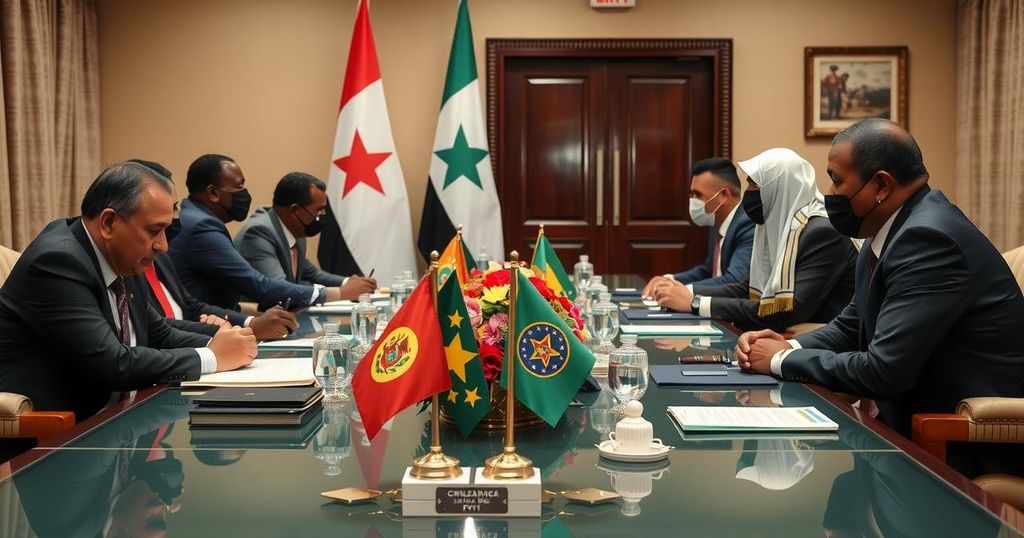Ethiopia reportedly seeks to replace Somalia’s Foreign Minister Ahmed Fiqi, encountering resistance from Egypt. This conflict arises amidst President Hassan Sheikh Mohamud’s visit to Ethiopia, where diplomatic ties were restored. The absence of Fiqi highlights tensions with federal member states, while debates surrounding Somalia’s foreign policy continue amidst scrutiny over external influences.
In recent developments, Ethiopia is allegedly pursuing the ouster of Somalia’s Foreign Minister Ahmed Fiqi, amid escalating tensions surrounding his position. This initiative faces significant opposition from Egypt, further complicating Somalia’s diplomatic strategies. This occurs concurrently with Somali President Hassan Sheikh Mohamud’s visit to Ethiopia, where he was warmly welcomed by Prime Minister Abiy Ahmed, resulting in the formal re-establishment of diplomatic relations between the two nations.
Noteworthy is the absence of Foreign Minister Ahmed Fiqi from President Mohamud’s entourage during this significant visit. Instead, he is engaged in negotiations in Egypt with his Egyptian and Eritrean counterparts, focusing on bolstering the trilateral alliance among the three countries, which aims to counter Ethiopia’s regional hegemony. Accompanying President Mohamud was Somalia’s Minister of State for Foreign Affairs, while reports suggest that Ali Balcad, a close advisor to the president, has taken responsibility for matters pertaining to Ethiopia at the Somali government.
Analysts express concerns that President Mohamud’s outreach efforts towards Ethiopia might be an attempt to diminish ties with Somali federal member states, specifically Puntland and Jubaland. These regions have cultivated strong relations with Ethiopia, serving as critical alliances in the face of regional security challenges posed by militant groups. Furthermore, Ethiopia’s long-standing security engagement in Somalia is underlined by its recent inclusion of troops in the restructured African Union peacekeeping mission, following an agreement with Ankara.
In this context, Egypt’s resistance against replacing Foreign Minister Ahmed Fiqi epitomizes the broader geopolitical rivalry prevalent in the Horn of Africa. Cairo has developed robust connections with Somalia and Eritrea via the trilateral alliance, perceiving it as a strategic check against Ethiopia’s burgeoning influence. This situation is reminiscent of prior controversies regarding Somali officials’ loyalty, particularly with the expulsion of former intelligence chief Mahad Salad over perceived favoritism towards Egyptian interests.
Critiques of President Mohamud’s foreign policy have intensified, with detractors asserting that it lacks coherence and relies excessively on personal favor rather than a comprehensive national security strategy. This inconsistency potentially exposes Somalia to external manipulation, jeopardizing its sovereignty and long-term recovery from protracted conflict. The ongoing tug-of-war between Ethiopia and Egypt for dominance highlights the fragile political landscape that continues to be shaped by the intricate geopolitical dynamics of the Horn of Africa.
The diplomatic scenarios involving Somalia, Ethiopia, and Egypt illustrate a complex interplay of regional power dynamics. Ethiopia has significant influence over Somalia, particularly in relation to federal member states such as Puntland and Jubaland, which maintain strong bilateral ties. The historical security partnerships established over decades impact the current geopolitical climate. Furthermore, Egypt’s concerns stem from a desire to regain influence amidst Ethiopia’s growing presence in Somali affairs, especially in the wake of alliances formed after historical interventions and recent military agreements.
The intricate dynamics of Somalia’s foreign relations are becoming increasingly pivotal amid pressures from Ethiopia and Egypt. While President Hassan Sheikh Mohamud seeks to cement his administration’s strategic interests with Ethiopia, resistance to foreign ministerial changes reflects deeper geopolitical rivalries that complicate Somalia’s recovery and sovereignty. As these nations vie for influence, the resultant tension may further endanger Somalia’s fragile political environment and hinder its progressive aspirations.
Original Source: www.garoweonline.com






